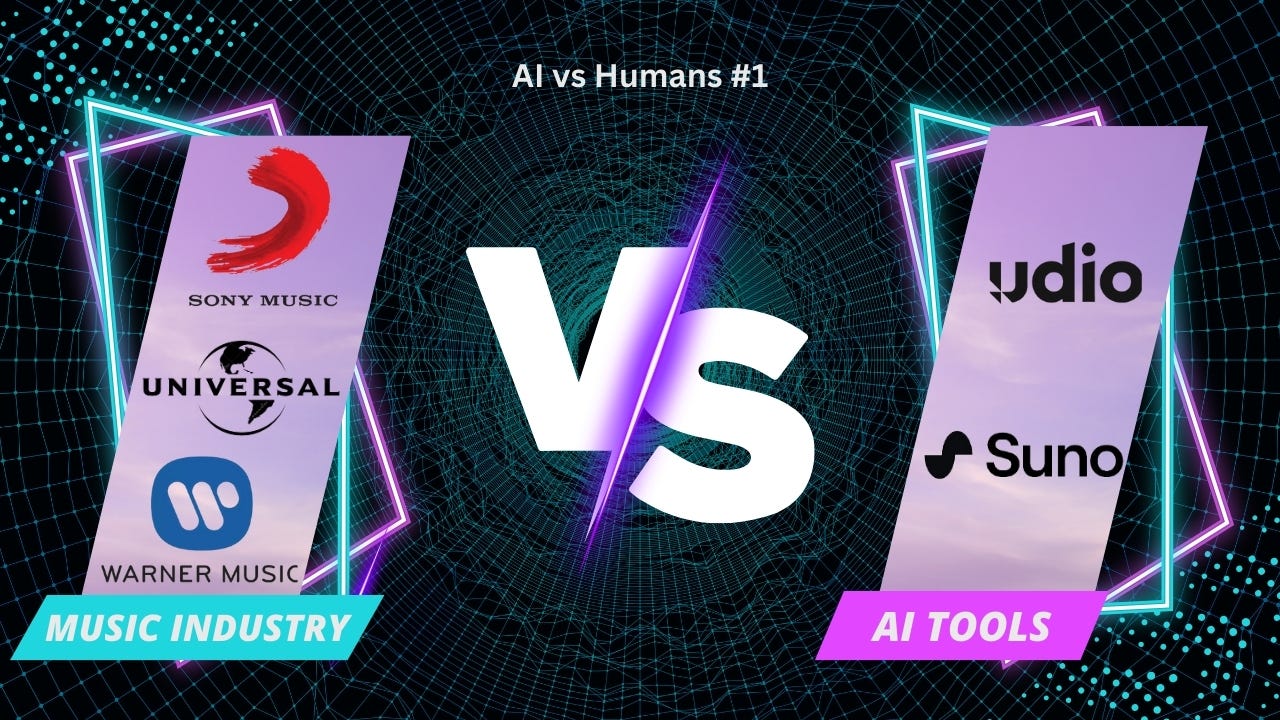Copyright laws exist for a reason! AI-generated content should not come at the cost of ripping off the original creators.
Major record labels, including Universal, Sony, and Warner, are taking AI music generators Suno and Udio to court over alleged copyright infringement. The labels claim these companies used copyrighted songs without permission to train their AI models that create new music from text prompts. The lawsuit seeks up to $150,000 in damages per infringed work.
Both companies have raised significant funds recently—Suno secured $125 million with a $500 million valuation, and Udio is reportedly generating 864,000 music files daily.
If Suno and Udio get hit hard, it'll be a strong message to all the other AI companies using copyrighted material for model training.
Suno Complaint: https://lnkd.in/dHRjRB54
Udio Complaint: https://lnkd.in/dHPFWim3
US Copyright Law: https://lnkd.in/dFbfNkJk
Big News in 𝗔𝗜 𝗠𝘂𝘀𝗶𝗰 𝗖𝗼𝗽𝘆𝗿𝗶𝗴𝗵𝘁 𝗟𝗮𝘄𝘀𝘂𝗶𝘁!
𝗕𝗮𝗰𝗸𝗴𝗿𝗼𝘂𝗻𝗱: Major record labels including Universal, Sony, and Warner sued AI music generators Suno and Udio in June 2024 for alleged copyright infringement, seeking up to $𝟭𝟱𝟬,𝟬𝟬𝟬 per work infringed.
𝗥𝗲𝗰𝗲𝗻𝘁 𝗥𝗲𝘀𝗽𝗼𝗻𝘀𝗲: Suno and Udio have now filed their answers, strongly 𝗽𝘂𝘀𝗵𝗶𝗻𝗴 𝗯𝗮𝗰𝗸 against the claims. They argue their use of copyrighted music for AI training falls under "𝗳𝗮𝗶𝗿 𝘂𝘀𝗲" doctrine. The companies also claim their outputs are new creations, not reproductions of existing songs.
'𝗙𝗮𝗶𝗿 𝗨𝘀𝗲' 𝗶𝗻 𝘁𝗵𝗶𝘀 𝗰𝗼𝗻𝘁𝗲𝘅𝘁: Fair use allows limited use of copyrighted material without permission for purposes such as criticism, comment, news reporting, teaching, scholarship, or research. The copyright law establishes 𝗳𝗼𝘂𝗿 𝗳𝗮𝗰𝘁𝗼𝗿𝘀 that must be considered in deciding whether a use constitutes a fair use.
𝟭. 𝗣𝘂𝗿𝗽𝗼𝘀𝗲 𝗮𝗻𝗱 𝗖𝗵𝗮𝗿𝗮𝗰𝘁𝗲𝗿:
↑ Commercial use, ↓ Fair use likelihood
↑ Transformative nature, ↑ Fair use likelihood
𝗧𝗵𝗶𝘀 𝗳𝗮𝗰𝘁𝗼𝗿 𝗹𝗶𝗸𝗲𝗹𝘆 𝗱𝗼𝗲𝘀 𝗻𝗼𝘁 𝗳𝗮𝘃𝗼𝗿 𝗳𝗮𝗶𝗿 𝘂𝘀𝗲. While the AI companies argue their use is transformative, creating new music rather than reproducing existing works, the use is fundamentally commercial in nature. They are profiting from services built on copyrighted material.
𝟮. 𝗡𝗮𝘁𝘂𝗿𝗲 𝗼𝗳 𝗪𝗼𝗿𝗸:
↑ Creativity of original work, ↓ Fair use likelihood
↑ Factual nature of original work, ↑ Fair use likelihood
𝗧𝗵𝗶𝘀 𝗳𝗮𝗰𝘁𝗼𝗿 𝗹𝗶𝗸𝗲𝗹𝘆 𝗱𝗼𝗲𝘀 𝗻𝗼𝘁 𝗳𝗮𝘃𝗼𝗿 𝗳𝗮𝗶𝗿 𝘂𝘀𝗲. Musical recordings are creative works at the core of copyright protection, rather than factual works which receive less protection.
𝟯. 𝗔𝗺𝗼𝘂𝗻𝘁 𝗨𝘀𝗲𝗱:
↑ Quantity/importance of portion used, ↓ Fair use likelihood
↓ Quantity/importance of portion used, ↑ Fair use likelihood
𝗧𝗵𝗶𝘀 𝗳𝗮𝗰𝘁𝗼𝗿 𝗶𝘀 𝗺𝗶𝘅𝗲𝗱. The AI companies used entire sound recordings, which typically weighs against fair use. However, they argue they only extracted statistical insights rather than storing the actual recordings, which could potentially favor fair use.
𝟰. 𝗠𝗮𝗿𝗸𝗲𝘁 𝗘𝗳𝗳𝗲𝗰𝘁:
↑ Negative impact on market, ↓ Fair use likelihood
↓ Negative impact on market, ↑ Fair use likelihood
𝗧𝗵𝗶𝘀 𝗳𝗮𝗰𝘁𝗼𝗿 𝗹𝗶𝗸𝗲𝗹𝘆 𝗱𝗼𝗲𝘀 𝗻𝗼𝘁 𝗳𝗮𝘃𝗼𝗿 𝗳𝗮𝗶𝗿 𝘂𝘀𝗲. The AI-generated music could directly compete with and potentially displace the market for the original copyrighted recordings. There's also potential harm to licensing markets for the copyrighted works.
Overall, based on traditional fair use analysis, at least 3 out of 4 factors seem to weigh against fair use. This case will be pivotal in determining how copyright law applies to AI training data. Courts evaluate fair use claims on a case-bycase basis, and the outcome of any given case depends on a fact-specific inquiry.
What are your thoughts on this issue? Is it truly "Fair" to say it is "Fair"?
https://www.courtlistener.com/docket/68878608/umg-recordings-inc-v-suno-inc/
https://www.nolo.com/legal-encyclopedia/fair-use-what-transformative.html
Fair Use doctrine: https://www.copyright.gov/title17/92chap1.html#107


